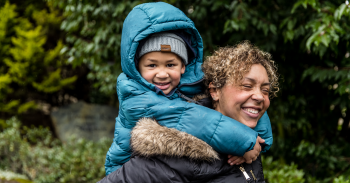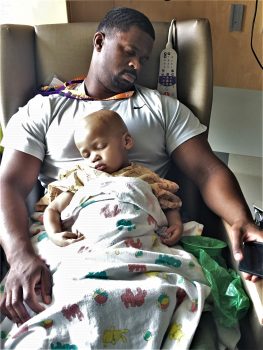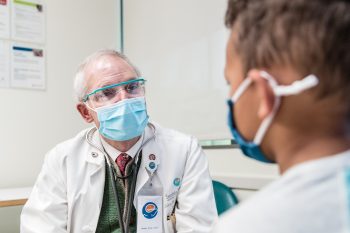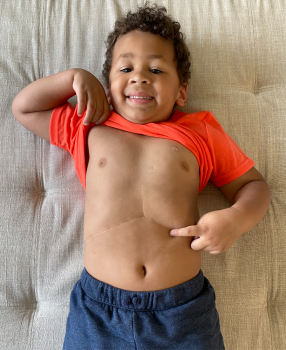
On July 19, 2017, Kelli and Dennis Williams sat in a pre-op room at Seattle Children’s with their 22-month-old son, Isaac. Kelli hugged her little boy close. He was dressed in a yellow hospital gown, happily playing with the iPad Child Life had loaned him. Kelli and Dennis did their best to appear calm in front of their son, but inside they were terrified.
Isaac had stage 4 high-risk neuroblastoma. He’d already been through four months of chemotherapy and now Dr. John Waldhausen, a surgeon specializing in neuroblastoma cases, was going to remove a tumor the size of a navel orange from his abdomen.
“I had been so focused on managing Isaac’s treatment plan that it didn’t hit me until that morning that my son was about to be lying on an operating table,” remembered Kelli. “I just held him and tried not to cry.”
The day before Isaac’s surgery, the Williamses invited their family members and their church pastor into their home.
“We all circled around Isaac,” said Kelli. “Our pastor prayed over him, he prayed for Dr. Waldhausen, that his hands and his team would get out exactly what needed to come out, and nothing more.”
As they waited in the pre-op room, Kelli and Dennis realized it would be the last time they would see Isaac’s smooth, flawless belly. After surgery, he would have a large scar, stretching from hip to hip and up to his chest, a permanent reminder of his illness.
“I lifted up his shirt and tickled his stomach before he went in, knowing it would never look the same,” remembered Dennis. “It made me pretty sad.”
When a nurse came to get Isaac, Kelli reluctantly handed over her child.
“We’re going to take good care of him,” the nurse kindly reassured her.
Isaac happily waved goodbye to his mom and dad, and they kept up their smiles until he was out of sight. Then Kelli broke down, letting out all the tears she’d been holding back.
“You never expect this to happen to your child…”

Isaac was 17 months old when he was diagnosed with neuroblastoma. He’d been having fevers off and on for a couple months before he was referred to Seattle Children’s. Tests revealed he had cancer and a large tumor in his abdomen.
“You never expect this to happen to your child,” said Dennis. “They said he had a 50/50 chance of surviving, like the flip of a coin.”
Thankfully, Isaac was exactly where he needed to be. Seattle Children’s providers are among the most experienced in the nation at treating solid tumors in children.
Still, Isaac had a long road ahead of him. He would need 18 months of treatment including chemotherapy, radiation, two stem cell transplants and surgery to remove his tumor.
“Initially, it felt impossible,” said Dennis. “But we put our faith in his providers and took it one day at a time.”
Isaac’s surgery was one of the more complicated aspects of his treatment. Neuroblastoma tumors are often wrapped around major blood vessels and can invade other organs. This was the case for Isaac.
Waldhausen remembers the tumor was invading Isaac’s right kidney and there was a chance he could lose the organ.
“We try to preserve kidney function in these kids as much as we can because the chemotherapy they get after surgery is potentially toxic for the kidneys,” said Waldhausen. “But with any of these surgeries, there’s a risk of losing the kidney. In a 2-year-old like Isaac, the diameter of a renal artery is only about 3 millimeters. When you are carving the tumor off that artery it can go into spasm long enough that the kidney loses blood supply and dies.”
Treating every child like his own

The risks of Isaac’s surgery frightened the Williams’, but they trusted Waldhausen.
“We did our research, so we knew he had experience with patients like Isaac,” said Kelli. “But it was more than that. When we spoke to him ahead of time he said he would treat our child like he was his own. That gave us a lot of confidence.”
Seattle Children’s surgeons have a unique level of expertise removing solid tumors from children with neuroblastoma.
“These are rare and unusual tumors,” said Waldhausen. “They don’t occur often, but we see many of them because of the size of our referral center and the reputation of our oncology program. We have a core group of surgeons who deal with these all the time and have gotten really good at taking them out.”
The best outcome
Emotionally exhausted but unable to sleep, Dennis and Kelli waited anxiously during Isaac’s surgery.
“I really appreciated how the surgical team communicated with us throughout Isaac’s surgery,” said Kelli. “Every hour a nurse updated us, so there was never a point when we were in the dark. We could feel confident knowing he was doing well.”
The surgery was expected to take 10 to 12 hours, but after just over six and a half John came out with good news: He’d removed the tumor and saved most of Isaac’s kidney. “It was the best outcome we could ask for,” said Kelli.
“It doesn’t get any better than that”

Today, Isaac is healthy and has been in remission for two years.
“He is a 52-pound brick!” exclaimed Dennis. “A super active 5-year-old who likes to wrestle with his brother and is learning to read. Once his treatment ended, he got right back to regularly scheduled programming. He didn’t skip a beat!”
Isaac has hit all developmental milestones and is preparing to start kindergarten in the fall. Without knowing his story, no one would ever guess he had cancer, unless they saw the scar on his stomach.
“I see Isaac’s scar in a positive way now,” said Dennis. “As one step he had to take to get him to where he is now.”
“It’s a sign that he survived,” added Kelli. “When he’s old enough to understand what he went through, we’ll have a really powerful story to share with him.”
Despite the challenging treatments he endured, Isaac still loves visiting Seattle Children’s.
“Every nurse we had, the nursing assistants, the support staff — everyone at Seattle Children’s was so welcoming,” said Kelli. “Even today, when we go to the hospital, Isaac always wants to stay. He’s like, ‘Where’s my room?’ He has such positive memories of this place. Without the amazing people working there, he’d have a totally different outlook.”
While the Williamses pray Isaac never has to go through cancer treatment again, Kelli and Dennis would not hesitate to bring him back to Seattle Children’s if they had to.
“There is no better place for neuroblastoma treatment,” said Kelli. “We were treated with the utmost respect and empathy. I can’t say enough about Dr. Waldhausen and Isaac’s oncologists Drs. Julie Park and Navin Pinto. They saved our son’s life. It doesn’t get any better than that!”
Kelli and Dennis Say Thank You
“To everyone at Seattle Children’s who played a part in Isaac’s care, thank you. You treated us like family and we will never forget that. Without you, I don’t know how we would have gotten through this.”
Read more about Isaac as Dennis Williams shares how he and his family coped after his 17-month-old son was diagnosed with stage-4 cancer at Seattle Children’s that had spread through his tiny body.

